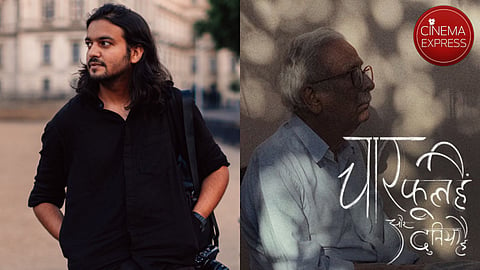

Blending the mundane with the magical, the poems of Vinod Kumar Shukla weave a world of their own. The earthly sounds of Hindi are so rooted in his poems that it's difficult to imagine them in a different language. For instance, consider the titles of his poems translated into English by Arvind Krishna Mehrotra: ‘Kabhi Ke Baad Abhi’ becomes ‘After then comes now’, and ‘Koi Adhura Poora Nahi Hota’ becomes ‘Nothing unfinished is completed’. Or take the title of his novel, ‘Deewar Mein Ek Khidki Rehti Thi’, which becomes ‘A Window Lived in a Wall’ when translated by Satti Khanna to English. It is difficult to retain the luminous essence of his words in a different language. Director Achal Mishra understands this struggle. The title of his newest film (streaming on MUBI), capturing Shukla at his home over two afternoons, is named after his poem ‘Chaar Phool Hai Aur Duniya Hai’. Achal feels it is nearly impossible to render this in another language. “Arvind ji has translated a lot of his poems, but even he gave up with this one,” he reveals.
Interestingly, Achal first discovered the poet through Arvind’s English translations before reading the original in Hindi. “His poems have become a part of my daily life now,” says Achal. However, he never thought of making a film on the writer; it was a coincidence. Achal was visiting his friend Nihal Parashar along with actor and writer Manav Kaul. One day, they were talking over sips of coffee and Manav casually brought up visiting Shukla. “Just out of the blue, he made a call. I asked him if I could tag along and shoot something. The plan was simple: We'll visit him, shoot and then come back,” he recalls. During this first visit, Achal remained an observer while Manav guided the conversation with Shukla. It was overwhelming for Achal to be handling the camera and sound all by himself. “I couldn't shoot through the first half of the day. I was just so engrossed in listening to him. If he looked at me while shooting, my camera would just drop,” Achal smiles. He aimed to correct that during the second visit when he brought more quietness into the frames.
The conversational nature of Chaar Phool Hai Aur Duniya Hai made the editing process difficult for Achal. “I was trying to make it more than what it was,” he says. “Finally, I just accepted the limitations of the conversation and tried shaping it in a certain way.” However, through the visuals, Achal tries to go beyond what is being spoken about. His shots evoke a similar tenderness that is present in the poems of Shukla. Closing in on the rustle of leaves from a tree in the backyard of his home or capturing the tiny movements of birds, Achal creates a mood piece of textures. In a delightful, layered image, he points the camera at a wall gleaming with afternoon sunlight as a faint shadow of Shukla falls on it as he walks around. Supporting this is Shukla’s frail yet stern voice as he reminisces about the film, which is made by Mani Kaul based on Shukla's novel, Naukar Ki Kameez. The two shared a lively collaboration until Kaul’s untimely death. The filmmaker was in the process of adapting another one of Shukla’s novels. Has Achal ever thought of making a film on Shukla’s books? He says, “I don't think I am capable of doing that. Maybe I will try out one of his short stories at some point.”
There is some congruence in the work of Vinod Kumar Shukla and Achal’s films infused in the Maithili language. Just as Shukla imagines newer phrases to build a magical realm, Achal plays around with his visuals through a distinct sense of style, especially in his deeply personal debut feature Gamak Ghar (2019). Its visuals are drenched with nostalgia and loss, trying to place the characters in the still, layered, and matter-of-fact profundity. Away from the confines of the mainstream structure, Achal’s film wants to give a certain experience; like Shukla’s poems, Achal’s camera invites a sense of calm and silence. Which, some argue, limits the watchability of his films, but Achal doesn’t worry much about making his work accessible. “If you are just trying to do something to make it accessible, then that's not honest for me,” he says, adding that while making Gamak Ghar, he knew they would only be able to reach a certain audience. “Even then, the kind of reach it got was something we had not expected,” he says. In conclusion, Achal maintains that he doesn’t want to make commercial films. “I am content with the kind of films I make.”